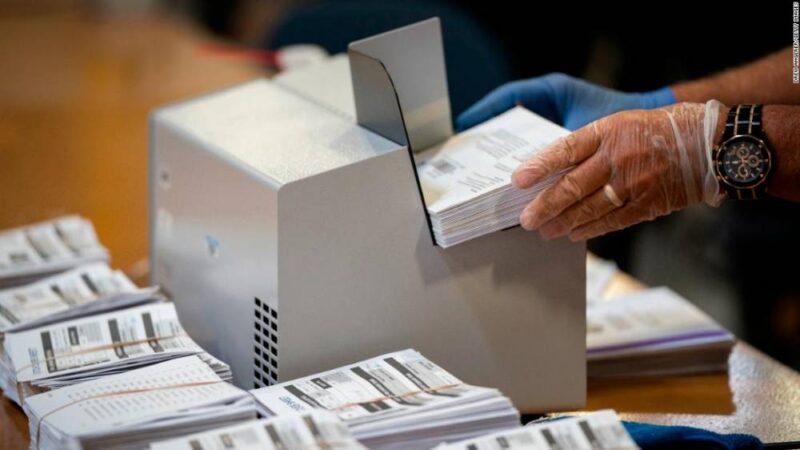Analysis: Elite investors accessing Trump briefings is everything that’s wrong with the stock market
New York (CNN Business)Accurate information can be incredibly valuable to investors, especially in the midst of a confusing health crisis threatening the American economy. Unfortunately, access to that kind of intel is unequal.
More proof of that came from a report by The New York Times describing how senior members of President Donald Trump’s economic team were privately revealing concerns in late February about the looming pandemic — warnings that stood in stark contrast to the administration’s public comments.At the time, Trump was assuring Americans on Twitter that the coronavirus was “very much under control” and claiming the stock market was “starting to look very good to me!”
Word of private uncertainties held by US officials quickly spread to elite investors via a hedge fund consultant, the Times reported. That intel gave these traders a crucial leg up on common investors, allowing them to make timely bets that stocks would drop.”Short everything” was the reaction of one major investor briefed on the memo from the hedge fund consultant, the Times said. Read More

Elizabeth Warren slams Disney for laying off thousands of workers after awarding fat executive pay packagesBy March 11, the S&P 500 had tumbled into a bear market, the fastest 20% decline from record highs in US history. In the span of just weeks, trillions of dollars of market value was wiped out as the true magnitude of the pandemic became clear. Although the Times said the briefings may not have violated any securities laws, the episode fuels a sense of unfairness about modern financial markets. Elite investors have the resources to make bigger bets than average investors, while using faster technology and often better intel. Not only can sophisticated investors avoid losses the masses endure, but they can short the market — profiting while others suffer. “It gets to the whole idea that’s out there, both on the left and the right, that there are two systems here,” billionaire hedge fund manager Jim Chanos told Hedgeye Research on Thursday. “There’s a system for the corporate class and financial class, and then there’s a system for everybody else. Covid has just made that worse.”
$100,000-a-year advice
Hedge-fund consultants like the ones raised in the Times story charge up to $100,000-a-year for access to their written reports, according to Wall Street veteran Nicholas Colas. And for premium access, these consultants can charge several hundred thousand dollars a year, Colas said. (It’s not clear how much, if anything, the hedge fund consultant described by the paper charged). “In this case, the warnings proved quite prescient,” said Colas, who worked between 1999 and 2001 at former hedge fund SAC Capital, which pleaded guilty to insider trading in 2013. “But there is no guarantee that consultants are right. I can’t tell you how many calls we got at the old SAC saying this company is going to buy that company. Ninety percent of the time they were wrong.”Still, elite traders get access to information that everyday investors don’t because they can’t afford $100,000-a-year consultants. Many don’t even have that much money in their investment portfolios.

A contested election could cost America its AAA credit rating”If I had better information available to me, maybe I would have made better decisions,” said Shonna Clark, a 34-year-old single mother in Minnesota who was laid off in March because of the pandemic. Clark, who is collecting unemployment and supporting two disabled children, said she sold her Apple (AAPL) stock in June because of concerns about the economy and a need for cash. Apple’s stock gained by about a third since June.”I’m barely making it by. I’ve already gone through my savings,” she said.
Swift market rebound
Although stocks crashed into the fastest bear market in history, they also swiftly rebounded. The pandemic bear market turned out to be the shortest on record and today US stocks are near record highs. That means someone who sold an index fund tracking the S&P 500 in late February and stayed on the sidelines would have avoided short-term losses — but also missed out on the subsequent rebound. The S&P 500 is near record highs today — it’s up 7% on the year — despite a slide on Thursday. By comparison, an index tracking the performance of hedge funds was basically unchanged on the year as of the end of September, according to Hedge Fund Research. In other words, the average person with a long position in the S&P 500 is beating the average hedge fund.”So did you want that [private coronavirus briefing] information? I don’t know,” said Colas, co-founder of DataTrek Research.Although the stock market fully recovered its losses, large swaths of the market (and the economy) have not. For instance, concert ticket seller Live Nation (LYV) is still off by 25% this year, while United Airlines (UAL) is down 61%. Cruise giant Carnival (CCL) has lost a staggering 72% of its value this year. Treasury Secretary Steven Mnuchin dismissed the Times report on Thursday as “another exaggeration” by the paper. “I can’t imagine this occurred,” Mnuchin told CNBC. “By the way, there were plenty of investors who had their own views of what was going on at the time and were very concerned rightfully.”
‘Sugarcoated’ comments from Trump officials
The other hard truth is that investors can’t take public statements from the Trump administration at face value. “But the problem is — and what crystalized that story — the feeling that the public was getting one set of briefings from White House spokesmen, ‘Not to worry — it’s mostly contained, or all contained’ and then donors and insiders were getting a different set of more worrisome briefings inside the White House,” Chanos, the billionaire hedge fund manager said. For instance, Trump economic adviser Larry Kudlow was proclaiming on CNBC in late February that the virus was contained in the United States “pretty close to airtight.” But privately that same day Kudlow delivered a more ambiguous message that acknowledged uncertainties over the outbreak, the Times reported. Likewise, Trump’s conversations with legendary journalist Bob Woodward show that the president knew the virus was dangerous, airborne and highly contagious. “This is deadly stuff, Trump told Woodward on February 7. “I feel like they sugarcoated a lot of stuff. They needed to let the public know more about what was going on,” said Clark, the single mom from Minnesota.
Colas said the episode is another reminder that investors must think for themselves and realize that sometimes officials and CEOs will only paint the rosiest of pictures. “Welcome to Wall Street,” he said.
Source: edition.cnn.com

